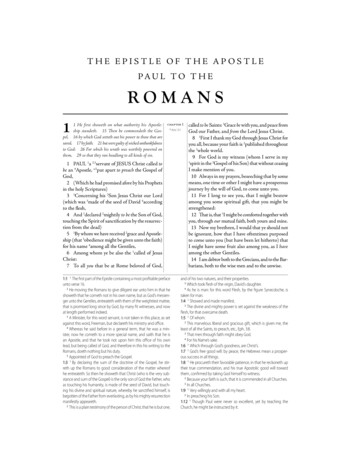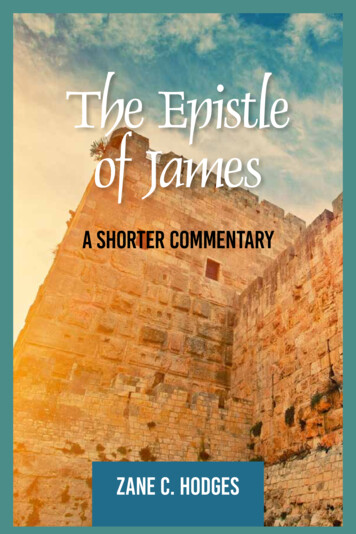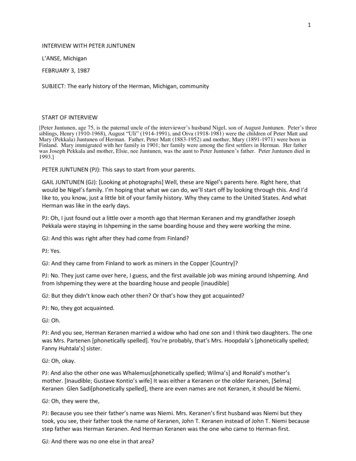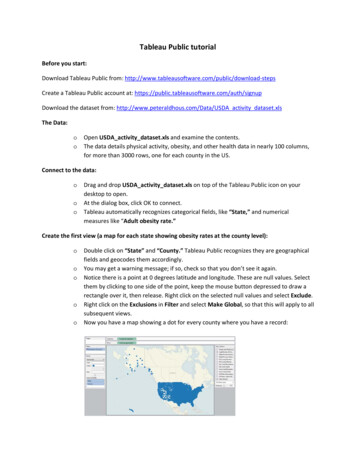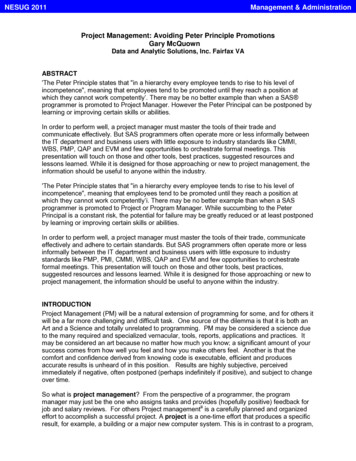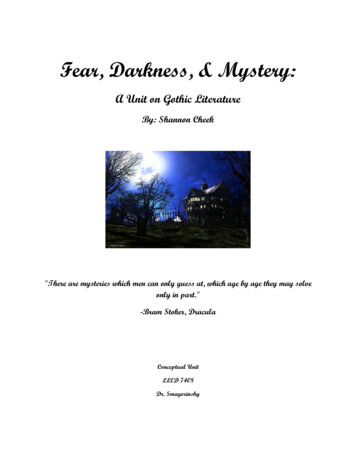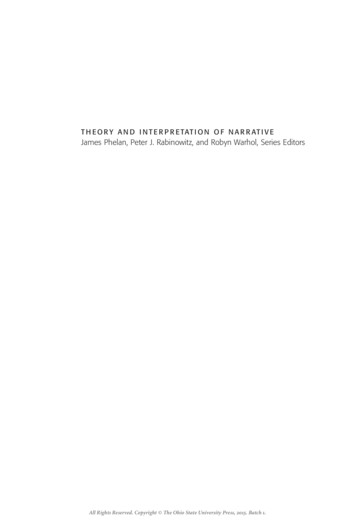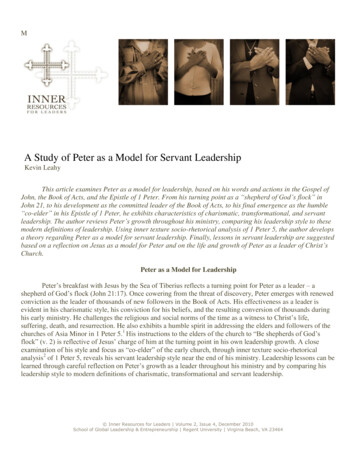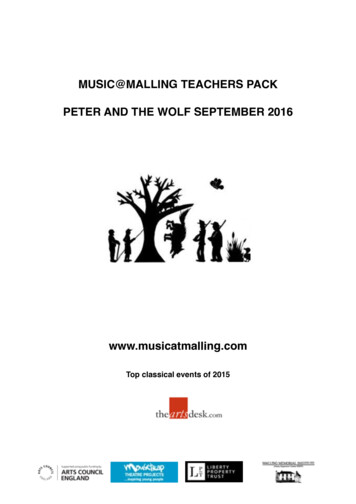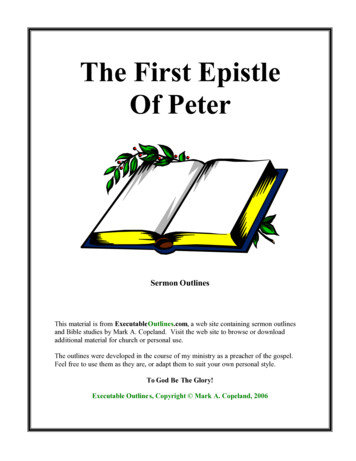
Transcription
The First EpistleOf PeterSermon OutlinesThis material is from ExecutableOutlines.com, a web site containing sermon outlinesand Bible studies by Mark A. Copeland. Visit the web site to browse or downloadadditional material for church or personal use.The outlines were developed in the course of my ministry as a preacher of the gospel.Feel free to use them as they are, or adapt them to suit your own personal style.To God Be The Glory!Executable Outline s, Copyright Mark A. Copeland, 2006
Mark A. CopelandThe First Epistle Of PeterTable Of ContentsPilgrims Of The Dispersion (1:1)The “Elect” Of God (1:2)A “Living” Hope (1:3-5)Joy Inexpressible And Full Of Glory (1:6-9)Ministering Not To Themselves, But To Us (1:10-12)Fortifying The Focus Of Our Hope (1:13)Proper Conduct As Obedient Children (1:14-21)Loving One Another Fervently (1:22)The Living And Abiding Word (1:22-2:3)Jesus: Cornerstone, Or Stumblingstone? (2:4-10)Spiritual Sacrifices Acceptable To God (2:5)A Plea To Pilgrims (2:11-12)Pilgrims And The Governments Of Men (2:13-17)Commendable Conduct Before God (2:18-25)Our Duties As Wives And Husbands (3:1-7)Our Duties To Each Other (3:8-12)Preparing For Persecution (3:13-18)Peter’s Perplexing Passage (3:18-20)The Antitype In Which God Saves Us (3:21-22)The Militant Christian (4:1-6)Living In The End Times (4:7-11)Persevering Through Persecution (4:12-19)Peter’s Exhortation To Elders (5:1-4)Peter’s Exhortation To The Young (5:5-9)Be Hopeful! (5:10-14)Sermons From First 762
Mark A. CopelandPilgrims Of The Dispersion1 Peter 1:1INTRODUCTION1. Throughout the New Testament, various phrases are used to describe those people of God whomake up the Lord’s churcha. Individually, they are referred to as disciples, saints, believers, priests, Christians, etc.b. Collectively, they are called the church, the church of God, churches of Christ, the body ofChrist, the temple of God, the family of God, etc.-- Each of these terms describe various relationships maintained by those who are Christians2. An interesting phrase not commonly used in reference to the people of God is found in 1 Pe 1:1,where Peter addresses “The Pilgrims Of The Dispersion”3. A proper understanding of this phrase can be very beneficial, and give us insight into:a. What the Christian life isb. An important responsibility expected of Christiansc. Our true home, and goal in this life[Let’s start by.]I. DEFINING “PILGRIMS OF THE DISPERSION”A. THE WORD TRANSLATED “PILGRIM” IS INTERESTING.1. Transliterated from Greek, it is parepidemos {par-ep-id’-ay- mos}, which is a combinationof three words:a. para - “alongside of”b. epi - “upon”c. demos - “used in Biblical Greek of the people of a heathen city” (Wuest)2. Here, then, is how Thayer defines the word.a. “one who comes from a foreign country into a city or land to reside there by the side ofthe natives”b. “a stranger”c. “sojourning in a strange place, a foreigner”d. “in the NT metaph. in reference to heaven as the native country, one who sojourns onearth: so of Christians (1 Pe 1:1).of the patriarchs (He 11:13).”3. Another definition: “One who stays in a place as a stranger or visitor; to describe Christianswhose final citizenship is in heaven and who are regarded as temporary dwellers on earth.”(Zondervan Pictorial Encyclopedia Of The Bible)B. THE MEANING OF THE WORD “DISPERSION”.1. The Greek word is diaspora {dee-as-por-ah’}a. It is noun form of the verb diaspeirob. Which means “to sow, to scatter seed”2. The term is found in Jn 7:35, where it refers to the Jews who scattered among the Greeksa. As a result of the Assyrian and Babylonian captivitiesSermons From First Peter3
Mark A. Copelandb. This has caused some to conclude that Peter was writing to Jewish Christiansc. Who were living in the regions of Asia Minor (modern day Turkey) - cf. 1 Pe 1:13. But there is good reason to believe that Peter was writing to ALL the Christians, bothJewish and Gentile, who were scattered throughout Asia Minora. Comments are made in this epistle that cannot be understood in reference to the originalrecipients being Jews - cf. 1 Pe 1:14,18,20-21b. More likely, Peter employs terms once limited to the Jews, but now applicable to allwho are in Christ1) For example, terms like “elect” (1:2), “holy nation” (2:9), “people of God” (2:10)2) Even as Paul did: “circumcision” (Ph 3:3), “Israel of God” (Ga 6:16)4. If this be so, then Peter implies by using the term “pilgrims of the dispersion” that allChristians are:a. Pilgrims living in a world not their ownb. Like scattered seed, spread out among those in the world[With this understanding of the phrase, “Pilgrims Of The Dispersion,” we can now draw insights thatare implied by it.]II. INSIGHTS FROM BEING CALLED “PILGRIMS OF THE DISPERSION”A. THIS PHRASE REVEALS WHAT THE CHRISTIAN LIFE REALLY IS.1. It is but a journey, begun when we first became Christians, ending only when we reach ourtrue destinationa. This ought to affect our entire perspective on life1) It is not an end in itself2) Only a temporary trip toward our final destination3) Our homes, our jobs, take on a different meaning when viewed in this lightb. This ought to affect our perspective on death1) Not the end of life, but the end of our journey!2) Not the end of life, but the beginning of eternity in our true home!2. Embarked on this journey, we become like our spiritual father, Abrahama. Notice He 11:8-10, 13-16b. If this be our attitude towards this life.1) Then God is not ashamed to be called our God2) And we can honestly sing songs like “This World Is Not My Home”B. THIS PHRASE REMINDS US OF AN IMPORTANT RESPONSIBILITY.1. Our responsibility as “pilgrims” is to be separate - cf. 1 Pe 2:11-12a. We may be “in the world,” but we are not to be “of the world” - Jn 17:15-16; 2 Co6:14-7:1b. Remaining separate may cause some to think we are strange - cf. 1 Pe 4:3-4c. But Jesus said this would happen, even as it did to Him - Jn 15:18-192. Figuratively speaking, we should be like those foreign refugees now in our country:a. Who resist giving up their heritage, their languageb. Who resist attempts to “Americanize” them and destroy their cultural traditions3. Can it be said of us who are Christians, that we are keeping ourselves separate from theworld?a. Are we allowing the world to influence our.1) Speech?Sermons From First Peter4
Mark A. Copeland2) Dress?3) Conduct?b. If we so, then we are no longer “pilgrims,” but “naturalized citizens” of this world!c. Remember John’s warning in 1 Jn 2:15-17C. THIS PHRASE OUGHT TO REMIND US OF OUR TRUE HOME.1. Our citizenship is in heaven, from which we eagerly await our Savior - Ph 3:20-212. We are to be looking for “a new heavens and a new earth” - 2 Pe 3:13-143. That is where we will find our true home, the city.a. “which has foundations, whose builder and maker is God.” - He 11:10,16b. That is “the one to come” - He 13:14c. That “comes down out of heaven from God” - Re 21:1-22:5-- That is where we, who are now simply strangers and foreigners scattered like seed inthis world, will one day be gathered together!4. Those who are truly “pilgrims” will think often of their true homea. When my family lived in Taiwan, we thought often our home in the statesb. And so we will think often of our heavenly home, if we are truly “Pilgrims Of TheDispersion”!CONCLUSION1. Are we “Pilgrims Of The Dispersion”? We are, if as Christians we.a. View our life here on earth as a journey in a foreign land!b. Keep ourselves separate from things in the world that would lead us away from God!c. View our as true home, the heavenly city God has prepared from those who confess they arestrangers and pilgrims on the earth!2. But you are not a “Pilgrim Of The Dispersion” if.a. You have not yet begun your spiritual sojourn by obeying the gospel of Christ!b. Having done so, you allow the attractions of the world to discontinue your journey and “settledown” in things which would separate you from God!Are you a “Pilgrim Of The Dispersion”?Sermons From First Peter5
Mark A. CopelandThe “Elect” Of God1 Peter 1:2INTRODUCTION1. In our previous study, we noticed Christians referred as “Pilgrims Of The Dispersion”.a. This description implies that Christians are but strangers, foreigners, sojourning in a land nottheir own, and scattered about like seedb. With their citizenship in heaven, they may be in this world, but they are not to be of this worldc. Therefore, one of their important duties is to be separate - cf. 1 Pe 2:112. One might think that since Christians are “scattered strangers” in this world, they are to be pitied3. Not so, for though they are strangers in the world, they are the “elect” of God - 1 Pe 1:2a. The word “elect” simply means “chosen” and is thus translated in 1 Pe 2:9-10b. There we learn Christians are “a chosen generation”; they are truly God’s chosen people!4. In this lesson, we shall consider what it means for Christians to be “The ‘Elect’ Of God”[Using comments in 1 Pe 1:2 as an outline for this study, we see first that as “The ‘Elect’ Of God”.]I. WE ARE A PART OF GOD’S PREDETERMINED PLANA. PETER SAYS “ELECT ACCORDING TO THE FOREKNOWLEDGE OF GOD”.1. The word “foreknowledge” comes from “prognosis” {prog’- no-sis}2. It means “forethought, pre -arrangement”3. I.e., being the “elect” (chosen) of God is in keeping with God’s plan designed beforehand4. As B. W. Johnson says in his “People’s New Testament” commentary: “Their electionand salvation was in accordance with God’s predetermined purpose to save men throughthe gospel, and hence, according to foreknowledge.”B. PAUL EXPOUNDS UPON THIS “PRE-ARRANGEMENT” IN EPHESIANS.1. God planned it before the world began - Ep 1:42. It anticipated the “chosen” being holy and without blame - Ep 1:43. It looked forward to the “elect” being adopted as sons - Ep 1:54. This plan is according to God’s good pleasure - Ep 1:55. This plan has a goal that the “elect” walk in good works - Ep 2:10C. WAS THIS “ELECTION” INDIVIDUAL OR CORPORATE.?1. I understand election by God to have been general, not particular; corporate, not individual2. That it would be “the body of Christ, the church as a whole”.a. Which God chose to be the recipients of His divine and gracious purposesb. And which He planned beforehand (foreknowledge) to carry out in Christ Jesus3. While in the “corporate” sense this choice is unconditional and final, as “individuals” wemust be “diligent to make your calling and election sure” - 2 Pe 1:101) Just as Israel (as a nation) had been chosen by God to receive His blessings2) But individually, the Israelites also had to make “their calling and election sure”Sermons From First Peter6
Mark A. Copeland[So by being in Christ, we are God’s “elect”, and involved in a plan which was in the mind of Godbefore time began and which is still in the process of being worked out! The implication of this is thatthose who are God’s “elect” are very special to God. As we return to 1 Pe 1:2, we learn also that.]II. WE BECOME GOD’S “ELECT” THROUGH THE SANCTIFYING WORK OF THESPIRITA. SANCTIFICATION AND THE HOLY SPIRIT.1. Sanctification, the process by which we are “set apart” for God’s purpose, is accomplishedby the Holy Spirit2. There are several passages that describe the connection between the Holy Spirit and oursanctification - Ro 15:16; 1 Co 6:11; 2 Th 2:13B. HOW THE HOLY SPIRIT ACCOMPLISHES THIS “SANCTIFICATION”.1. It is through the Word of Goda. The Holy Spirit would reveal the Word to the apostles - cf. Jn 16:12-13b. Through this revealed Word, we are “sanctified” (set apart) - cf. Jn 17:172. Therefore, when people obey the Word of God which has been revealed by the Holy Spirit,they become “chosen.to salvation” through:a. “sanctification of the Spirit” (the Divine side of conversion, as the Spirit has revealedthe Word and convicts men of sin through it)b. “and belief of the truth” (the human side of conversion, as they believe it) - cf. 2 Th2:13-14[Having been “sanctified” (set apart) by belief in the truth, and as God’s “elect” now a part of Hiseternal plan, you might expect such privileges would call for certain responsibilities. Indeed it does, foras God’s “elect”.]III. WE HAVE THE RESPONSIBILITY OF OBEDIENCE!A. GOD’S CHOSEN ARE EXPECTED TO BE OBEDIENT.1. We saw earlier in Ep 2:10 that it was part of God’s plan before time began that the peopleof God would “walk in good works”2. This is all part of God’s wonderful grace as defined by Paul in Ti 2:11-143. We do not earn salvation by such good works (cf. Ti 3:5), but nonetheless we are to bediligent in doing them - Ti 3:1,8,14B. PETER WILL LATER EXPOUND UPON THE NEED FOR OBEDIENCE.1. As obedient children of God, we are to be holy - 1 Pe 1:14-162. We are even to submit to civil authorities, that we might silence the ignorance of foolish men- 1 Pe 2:13-163. Peter implies grave consequences to those “who obey not the gospel of God” - 1 Pe 4:17[Peter also tells servants and wives to be obedient, but this should suffice to impress upon us that theprivilege of being God’s “elect” involves the responsibility of being obedient to the will of the Lord.Finally, being the “elect” of God also means.]IV. WE HAVE THE BLESSING OF FORGIVENESS!Sermons From First Peter7
Mark A. CopelandA. WE ENJOY THE “SPRINKLING OF THE BLOOD OF JESUS CHRIST”.1. A clear reference to the blessing of forgiveness of sins made possible by the death of Christ2. The blessing of forgiveness is one enjoyed.a. When we first become Christians upon our baptism into Christ - Ac 2:38; 22:16b. As we confess sins throughout our daily walk with God - 1 Jn 1:7-9B. THIS BLESSING IS ONLY ONE OF SEVERAL MENTIONED IN PETER’SEPISTLE.1. He later speaks of “an inheritance” - 1 Pe 1:42. And the “salvation of souls” - 1 Pe 1:93. He describes Jesus as the “Shepherd and Overseer of your souls” - 1 Pe 2:254. He also refers to the care of God - 1 Pe 5:7CONCLUSION1. We hope to exam
para - “alongside of” b. epi - “upon” c. demos - “used in Biblical Greek of the people of a heathen city” (Wuest) 2. Here, then, is how Thayer defines the word. a. “one who comes from a foreign country into a city or land to reside there by the side of the natives” b. “a stranger” c. “sojourning in a
